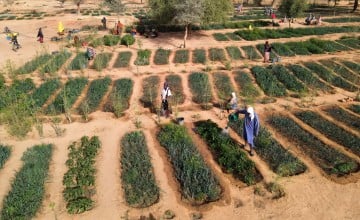
IN the semi-arid villages of two Northeastern counties, a quiet but
telling shift is sprouting in backyards and community plots. Once a space
largely reserved for women, kitchen gardens — small, sustainable food plots —
are increasingly being tended by men.
“It’s not just women anymore,” says Halake Wario, a youth leader in
Marsabit. “Men have started showing up with seeds and shovels. They want to
feed their families, yes, but also to take part in something meaningful. It's a
different kind of masculinity — one rooted in nurture rather than control.”
A growing number of men in Isiolo and Marsabit counties are showing interest
in kitchen gardening, a practice traditionally associated with women, according
to the latest quarterly report by the Defenders Coalition.
The shift came to light during a series of the Mama Mazingira Dialogues
held in preceding quarters of 2025, which brought together women
human rights defenders, community members, and the state and
non-state actors on policy from both counties.
The dialogues focused on issues surrounding land rights, environmental
protection, and climate change.
According to the lobby, sustained community dialogues on how grassroot
communities could take matters into their own hands on climate change,
sustainable land use, afforestation and stop poaching is slowly causing
mindset change.
It is no longer a subject left to doners and NGOs, the lobby says. The
community is taking ownership.
Defenders Coalition executive director Kamau Ngugi said the development
proved that community engagements at the grassroots has the potential to cause
meaningful positive changes that improve lives.
He says the dialogue series is causing a shift on cultural norms that have
been oppressive especially to women.
"The dialogues are carried out in an environment of respect, mutual
understanding and non-judging and this sparks flow of ideas and people opening
up on how things can be changed," he said.
Of more interest is the fact that more men are taking kitchen gardening
seriously and are now on the frontline of ensuring a sustainable supply of
vegetables for their families rather than wholly relying on pastoralism and
leaving the farm to the women.
“The dialogues uncovered pressing challenges including land grabbing,
climate-induced economic strain, water scarcity, and gendered insecurity -
while also highlighting the role of WHRDs in advancing sustainable livelihoods
through agroecology,” the report says.
“Notable outcomes included strengthened community cohesion, increased
inclusion of women and persons with disabilities in climate discourse, and
growing interest among men in kitchen gardening.
“The sessions also amplified calls for WHRD protection, leadership
inclusion, and responsive local policy mechanisms. These engagements affirmed
the importance of centering grassroots voices in climate governance and
reinforced Defenders Coalition’s commitment to inclusive, rights-based climate
advocacy,” the quarterly report says.
In many Northeastern communities, traditional livelihoods like pastoralism
are facing increasing challenges due to climate change, droughts, and resource
scarcity. This has led to a greater emphasis on diversifying income sources and
improving food security at the household level.
Men are increasingly recognising the potential of kitchen gardening to
supplement their income, provide nutritious food for their families, and build
resilience against environmental shocks.
In places like Isiolo, kitchen gardening is not just for home use but also
for the market given the increasingly diverse and cosmopolitan society coming
up in the expansive county.
The report also highlights land grabbing, economic strain from
climate impacts, and water scarcity as key issues affecting residents. It notes
a growing inclusion of women and persons with disabilities in local climate
discussions.
















![[PHOTOS] Family, friends receive body of Raila’s sister, Beryl](/_next/image?url=https%3A%2F%2Fcdn.radioafrica.digital%2Fimage%2F2025%2F11%2Fdfe6a9bf-ede1-47a4-bdc0-4f564edb03dd.jpeg&w=3840&q=100)
